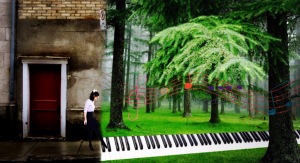I sat at the piano, daydreaming about a conversation I had with a friend earlier that day, when suddenly, I realized that my fingers were moving across the keyboard using only muscle memory. I stopped and couldn’t even remember where I was in the piece. This is what many musicians call “practicing”, quotation marks included. There’s quite a noticeable difference between “practicing” for 4 hours and deliberately practicing for 4 hours. Many people even say that “practicing” for two hours is equivalent to deliberately practicing for even less than thirty minutes. To be the most effective while practicing, musicians must value quality over quantity–practicing smarter, not harder.
Let’s start by talking about the general way to practice. Like anything else in your life, your practice time needs to be scheduled, planned, and organized. You might be thinking to yourself, what if I end up needing more time? or, what if I finish earlier than I planned? In these cases, allow yourself to finish whenever you need to, but only when you’re just starting out with using this method. As you keep on making planned schedules for your practice every day, you’ll start to understand yourself better, and hopefully, get to know the ideal amount of time for you to spend on each piece. Don’t be fooled though–the planning part of your practice might be harder than you think. Think over everything you have to do and start from there.
As you plan out your practice, make sure you’re planning breaks within your practice time. As Professor Kageyama said, “Practicing more than one hour at a time is likely to be unproductive and in all honesty, probably not even mentally or emotionally possible” (Kageyama, “How Many Hours a Day Should You Practice?“). No one can possibly hold intense concentration for more than an hour at a time without getting extremely exhausted, especially if you have to practice for around five or six hours a day. If you were playing a sport, there’s no way you can play non-stop for six hours at a time, or else you would probably end up collapsing. The same thing goes for playing an instrument. Practicing any instrument requires physical work, just like playing a sport, but also a lot of mental work. Give your body and brain a break!
Now that we’ve covered the planning aspect of your practice, let’s dive into the actual practicing part. Tsioulcas made a good point in her article, “10 Ways to Optimize Your Music Practice”, by saying that, although playing through a piece from the beginning every time you sit down to practice may seem effective and feels satisfying, focusing your attention on parts that need work is much more beneficial in the long run. She also said that practicing a piece from beginning to end will lead you to inconsistent performances, where your playing starts out strong, but then slowly declines in quality.
One mistake that many musicians make is their lack of patience. You need to have the willingness to sit down and perfect each section, note by note, until you’re happy with the end result. The best way to achieve your goal is to practice slowly and with a metronome. Your teacher has probably told you to do this millions of times, and for good reason. Again, this method requires a lot of patience, as it can be tedious and annoying. However, not only will it help stabilize your memory of the piece, but it will also allow you hear and fix all the little details in your playing, which will improve your overall performance.
The next time you sit down to practice, try to include some of these tips so that you can say that you really, truly practiced, without having to put air-quotes around the word. Using this new and improved way of practicing can boost effectiveness, and you’ll find that you’ll get a lot more done in a much more efficient manner. Many of these tips apply not only to practicing music but also to doing anything else that requires practice. These tips have been analyzed over and over again by many psychologists, and it’s guaranteed to help you prepare for anything, whether you’re practicing for an interview, public speaking, or even just learning a new skill!

